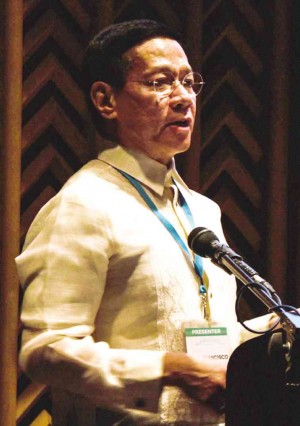Ex-CSC chief still marking governance scorecards
It’s as if former Civil Service Commission chair Francisco Duque III never left the government.
Duque still goes over lists to check if the names there pass transparency and performance standards.
Duque, however, has been out of government since stepping down from the quasi-judicial body in February.
The CSC chair has a seven-year mandate under the Constitution, but Duque only served for the remaining five years of the term of his predecessor.
“Even if I have left government, the work and challenges I’m confronted with are still very much government,” he says.
Duque has his hands full leading the non-partisan, non-profit Institute for Solidarity in Asia (ISA), which advocates transformative governance standards in the public sector.
Article continues after this advertisementISA grades participating national government agencies (NGAs) and local government units (LGUs) via the Performance Governance System (PGS), which is similar to the balanced scorecard developed in the United States to monitor the performance of companies against their strategic goals, except that this is for the public sector.
Article continues after this advertisementTransformation
After taking over ISA as chair, Duque busied himself with, along with other like-minded advocates from the private sector, choosing from PGS high scorers the so-called Islands of Good Governance (IGG).
These IGG refer to sector institutions that have transformed their operations because of good governance.
A public office will get a nod comparable to the ISO certifications given out by the International Organization for Standardization.
More than getting a red star on the back of the hand, however, public offices can gain a lot more from the IGG certification, Duque says.
Bold decisions
“Politically, it’s going to say a lot of good about them—that they made the bold decision of subjecting themselves to an audit. Normally, government agencies are allergic to audits. But here you are, these are islands of good governance that have stepped forward and said, ‘Look at what we’re doing, we’re transparent,’” he says.
He says the naming of the first IGGs comes at a very significant time—the start of the election period.
He says the certification serves as a badge of honor for the politician from the winning LGU.
“As I’ve said, IGG is a certification process that actually recognizes or honors institutions that have demonstrated exemplary transformation under a governance program that has brought about breakthrough results… At the end of the day, ramdam ba ito ni Juan at Juana? (Are the programs felt by ordinary Filipinos?) My answer is yes,” Duque says.
He says the program touted by the NGA or LGU must be sustainable and linked to public satisfaction.
“This should drive public trust and confidence of the public in the capacity of the government office to provide quality service,” he explains.
ISA announced the first IGGs during the Public Governance Forum in Manila on Oct. 20 to 21.
They are: the Department of Trade and Industry, which sought to boost the competitiveness ranking of the country to the upper third from the lower third in the World Economic Forum’s global competitiveness report; Bangko Sentral ng Pilipinas, for establishing an environment for financial inclusion; Philippine Heart Center, which aimed to transform regional medical centers into heart centers; and National Electrification Administration, which is trying to achieve 100 percent sitio energization.
The country’s soldiers also got badges of honor with their IGG win.
The Armed Forces of the Philippines pledged an increase in operational readiness in disaster response this year to 80 percent from 64 percent; the Philippine Army, which aimed to craft functional personal scorecards for 100 percent of its non-commissioned officers; the Philippine Navy, which sought to, among others, increase the number of ISO-certified units to 10 from 4 units and offices.
City governments
The city governments of Balanga, Butuan, Dipolog, Mandaue and Talisay were also named IGGs for their respective programs.
Auditing teams from KPMG, Deloitte and Institute of Internal Auditors Philippines Inc. searched every nook and cranny of these public offices’ financial books to determine if money has been spent well and that the projects can be scaled even with a change in leadership.
Duque says the IGGs will also get spots to showcase their achievements in front of a worldwide audience during the Asia Pacific Economic Cooperation Economic Leaders’ Meeting this November.
Duque clarifies that the auditing is not being imposed on all government offices, but only on those brave enough to open their books.
Asked to comment on the performance of controversial front-liners these days, such as the Metro Manila Development Authority, he only says: “We have not been engaged by the MMDA in its governance reform. Mahirap ipagsiksikan ang sarili (We can’t force ourselves on them).”
On Congress, he says: “It needs to come up with impactful and meaningful laws. They should remove laws that breed corruption.”
On the President, he says: “I think the President has the country’s best interests at heart. But he can’t do it alone.”
Heroes
In searching for IGGs, Duque believes there are many heroes within government offices.
“Don’t be pessimistic, that’s the last thing the country needs,” he says.
Asked if he is willing to go to politics, Duque says, “No, thanks… For as long as politics is defined by how much money you spend. I’m so allergic to it. I love politics, but the way you get yourself elected—you need money and popularity, not competence.”
Duque says he is comfortable monitoring the government from the sidelines.
Duque himself was responsible for steering the CSC to achieving 9.03 out of 10 in the PGS scorecard.
His performance there led to his appointment as ISA chair.
Asked when he will “retire” from government, Duque, also a former Health Secretary, says: “As long as I’m alive, I’d like to help influence governance… I derive strength from knowing that we have to make a difference, whether as a holder of a position of authority or an educator.”
